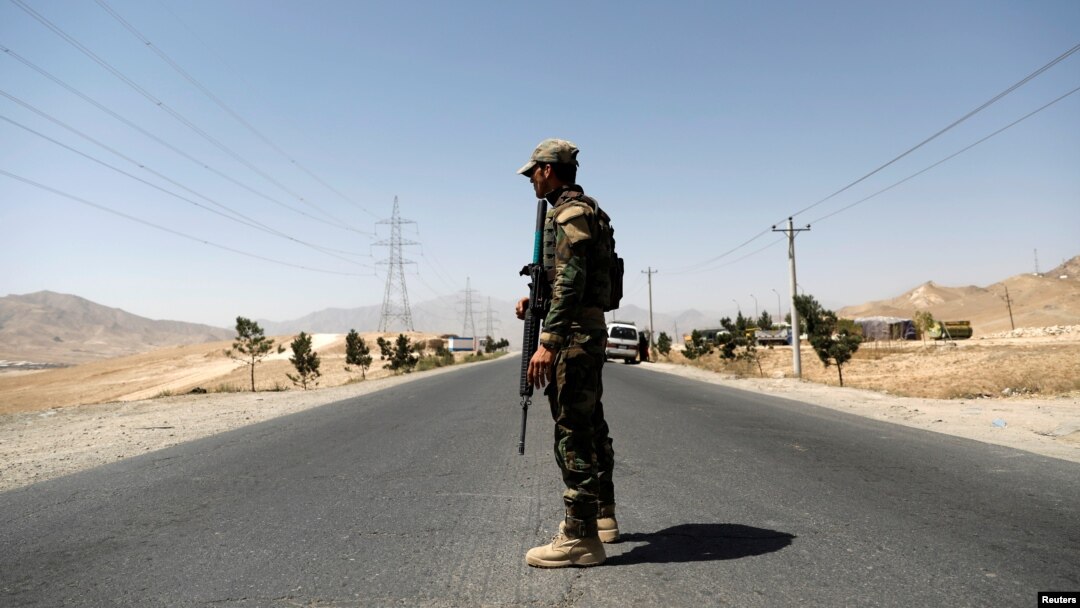Fresh fighting in central and eastern Afghanistan has killed at least 20 people, half of them civilians, fueling security concerns among voters ahead of this month’s parliamentary elections.
Authorities in the central Maidan Wardak province confirmed Sunday the Taliban overnight staged a major offensive on the Sayed Abad district headquarters.
The insurgents briefly overran key government installations in Sayed Abad, killing the district police chief along with at least nine other policemen. The Taliban also set fire to some official buildings before withdrawing from the district center, a usual rebel tactic.
Sayed Abad is located on the main highway linking the national capital of Kabul to southern Afghanistan. Insurgents blew up bridges on the highway before assaulting the district, blocking all traffic, the provincial governor, Mohammad Arif Shajahan, confirmed Sunday. The Taliban has also planted mines on parts of the high, he added.
Meanwhile, residents in the eastern Paktia province have informed top police officials that counterinsurgency airstrikes by government forces killed at least 10 civilians and wounded 20 others in Garda Sairi district.
A Taliban spokesman confirmed fighting in the area, claiming its fighters killed at least 10 Afghan security forces and wounded several others, though insurgent claims are often inflated.
Violence threatens elections
The deadly violence comes as Afghan voters are preparing to cast their ballots in the national parliamentary elections scheduled for October 20.
Afghan election officials say more than 2,500 candidates, including 418 women, are competing for the 249 seats in the lower house of parliament, the Wolesi Jirga.
The government has downplayed the security concerns, saying a comprehensive plan has been put in place to ensure voters’ safety and the safety of over 5,000 polling stations.
U.S.-led NATO forces have also pledged to support Afghan forces in securing the democratic process.
However, officials have acknowledged more than 2,000 polling centers will be closed for security reasons.
The Afghan parliamentary elections are being held after a delay of more than three years due to a variety of reasons, including security and lack of reforms.
Afghan war intensifies in 2018
The U.S. military announced last week it conducted 465 airstrikes in 26 of the 34 Afghan provinces in September against Taliban and targets linked to Islamic State terrorist group, underscoring an intensification in the war which has lasted 17 years as of Sunday.
Last month, the Afghan interior minister informed the parliament that insurgent attacks are killing 30 soldiers and policemen every day, strengthening concerns 2018 could be one of the deadliest years for government forces.
The Taliban controls or hotly contests around 50 percent of the Afghan territory while the local branch of IS, known as Khorasan Province or ISK-P, has also increased terrorist attacks against civilians, who are bearing the brunt of the war. U.N. officials have warned civilian casualties have reached new highs this year.
The Taliban on the eve of the 17th anniversary again demanded the U.S.-led “foreign occupiers” to withdraw their forces from Afghanistan and let Afghans themselves decide their future.
“This is the only sound and rational way reiterated by the Islamic Emirate [the Taliban] for as a realistic and factual solution of the issue,” said an insurgent statement issued Sunday.
It said the Islamist insurgency is determined to continue fighting "until and unless you, the invaders, are expelled from our homeland just like the previous ones."
The Taliban has consistently refused to hold peace talks with the Afghan government and it has been calling for direct talks the United States to settle the conflict, blaming Washington for starting the conflict 17 years ago.
The U.S. and its allies invaded Afghanistan to oust the Taliban for sheltering al-Qaida leadership blamed for plotting the terrorist attacks on America in September 2001.
The international alliance ended its combat mission in 2014 and its remaining around 20,000 troops, mostly Americans, under the Resolute Support mission are training, advising and assisting Afghan forces in battling the insurgency and IS terrorists.
While announcing details of its airstrikes last week, the U.S. military explained again that the operations are mean to prevent Afghanistan from becoming a safe haven to the ISK-P, al-Qaida and other terrorist organizations.
The operations in support of Afghan forces are aimed at applying "judicious military pressure to enable the Taliban’s eventual reconciliation, reintegration and realignment,” the U.S. military noted in its statement.


